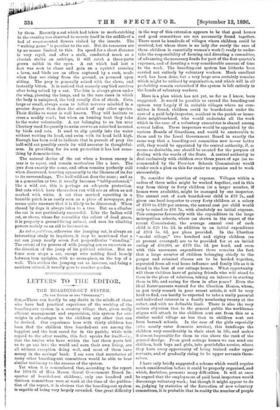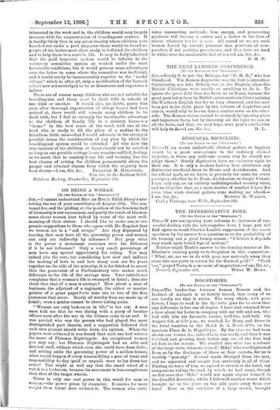LETTERS TO TIIE EDITOR.
THE BOARDING-OUT SYSTEM.
[To THE EDITOR OF THE " EFECTATOIL"
Stn,—There can hardly be any doubt in the minds of those who have had practical experience of the working of the boarding-out system in a country village that, given really efficient management and supervision, this system far out- weighs in advantages to the children any other that can be devised. Our experience here with thirty children has been that the children thus boarded-out are among the happiest and the best cared for in the parish ; while with regard to the after results, this fact speaks for itself—i.e., that the twelve who have within the last three years left us to go out into the world and earn their own living, are all without exception doing well, and most of them have money in the savings' bank. I am sure that secretaries of many other boarding-out committees would be able to bear similar testimony to the success of the system.
Yet when it is remembered that, according to the report for 1894.95 of Miss Mason (Local Government Board In- spector of boarded-out children), only one hundred and thirteen committees were at work at the time of the publica- tion of the report, it is obvious that the boarding-out system is capable of being very largely extended. One great difficulty in the way of this extension appears to be that good. homer and good committees are not necessarily found together. There must be hundreds of villages where children could be received, but where there is no lady (for surely the care of these children is essentially woman's work P) ready to under- take the responsibility of forming and directing a committee, of advancing the necessary funds for part of the first quarter's expenses, and of devoting a very considerable amount of time to the work. The boarding-out system has hitherto been
carried out entirely by voluntary workers. Much excellent work has been done, but a very large area certainly remains which might be utilised by organisation, and which will in all probability remain untouched if the system is left entirely in the hands of voluntary workers.
Here is a plan which has not yet, so far as I know, been suggested. It would be possible to extend the boarding-out system very largely if in suitable villages where no com- mittee is found, children could be boarded-out under the care of a paid lady-inspector, resident in the parish or imme- diate neighbourhood, who would undertake all the work which in the case of a voluntary committee is shared among several ladies. These inspectors would be appointed by the various Boards of Guardians, and would be answerable to them and to the Local Government Board in exactly the same way that a boarding-out committee now is—or better still, they would be appointed by the central authority, if, as seems so desirable, one should be created for the purpose of dealing with the wards of the State. A central authority to deal exclusively with children over three years of age (as re- commended by the Poor-law Schools Commission) would render such a plan as this far easier to organise and to work successfully.
To consider the question of expense. Villages within a radius of three miles might be worked together, and in this way from thirty to forty children (or a larger number, if homes were available), might be managed by one inspector. The annual cost of each boarded-out child is £13 7s., and. given one local inspector to every forty children at a salary. of £100 to £120 per annum, the annual cost per child would. only be raised to £16 7s., with absolutely no initial expense. This compares favourably with the expenditure in the large metropolitan schools, where (as shown in the report of the recent Commission), the average annual cost of each child is £28 14s. 2d. in addition to an initial expenditure of £104 5s. 6d. per place provided. In the Chorlton " model village," two hundred and eighty children (as. at present arranged) are to be provided for at an initial outlay of £50,000, or £178 11s. 5d. per head, and even with this enormous expenditure there remains the fact.. that a large number of children belonging chiefly to the pauper and criminal classes are to be herded together, separated from all real home influence and family life as it is. found in the best of our cottage homes. What opportunity will these children have of gaining friends who will stand to them in the place of relations, taking an interest in starting them in life, and caring for them in after years? Even the ideal foster-parents wanted for the Chorlton Homes, whom, as you truly remark in your recent article, it will be very hard to find, can hardly be expected to take a really parental and individual interest in a family numbering twenty at the outset, and with no definable limit. There is also the very serious objection that to the general public the workhouse stigma will attach to the children sent out from this or at similar model village no less than to children sent out from barrack schools. In the case of the girls especially (who mostly enter domestic service), this handicaps the children very considerably in their start in life, and makes- it almost impossible for them to rise above the rank of the general drudge. From good cottage homes we can send our children, both boys and girls, into gentlefolks service, *here they have every opportunity of being trained under upper servants, and of gradually rising to be upper servants them- selves.
I have only briefly suggested a scheme which would require much consideration before it could be properly organised, and which, doubtless, presents many difficulties. It will at once be argued that the employment of paid local inspectors would discourage voluntary work; but though it might appear to do so, judging by statistics of the formation of new voluntary committees, it is probable that in reality the number of people interested in the work and in the children would very largely increase with the augmentation of boarding-out centres. It is hardly likely that in any given locality where children were boarded-out under a paid inspector there would be found no -people of the better-most class ready to befriend the children and to help them to a start in life. It may be fully:admitted that the paid inspector system would be inferior to the voluntary committee system as worked under the most favourable conditions, but it would possess some advantages over the latter in cases where the committee was inefficient, .and it would surely be immeasurably superior to the " model village,'! which is, after all, only a modification of the barrack school now acknowledged to be so disastrous and expensive a failure.
There are of course many children who are not suitable for boarding-out, and these must be dealt with in schools of o ne kind or another. It would also, no doubt, prove that -even after thorough organisation of village homes had been arrived at, there would still remain many children to be 'dealt with, but I feel so strongly the inestimable advantage to the children of family life in a country house — a ▪ ‘ home " in the best sense of the word, with one at the head who is ready to fill the place of a mother to the friendless little ones—that I would advocate in the strongest possible terms the consideration of any plan by which the boarding-out system could be extended. All who have the true interest of the children at heart should not be satisfied so long as one possible cottage home remains unfilled, feeling, as we must, that in country home life and training lies the best chance of raising the children permanently above the pauper and criminal classes from which the majority have
been drawn.—I am, Sir, &c, ELEANOR M. HALCOMBE,
Hon. Sec. to the Balsham B.O.C.
Balsham Rectory, Cambridge, September 8th.



































 Previous page
Previous page